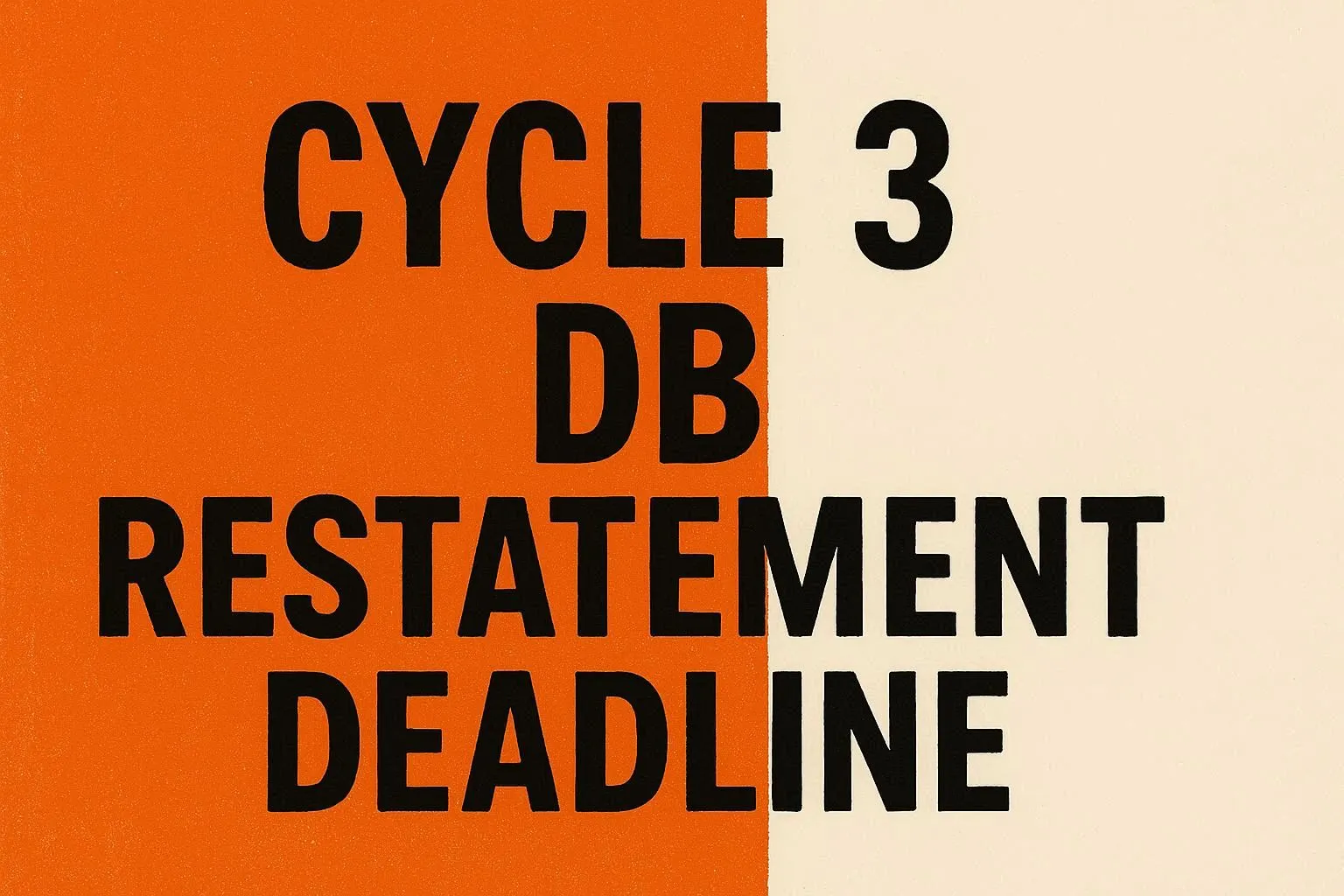Today we are talking about cycle 3 db restatement deadline, For any company or organization engaged in data management, especially those dedicated to upholding regulatory compliance, the cycle 3 db restatement deadline is a crucial occasion. We will go over the details of the cycle 3 db restatement deadline, its importance to organizations, and how to properly achieve it in order to prevent fines and business interruptions in this extensive tutorial.
What Is the Cycle 3 DB Restatement Deadline?
The precise period of time that companies have to update and reconcile their data systems, especially those pertaining to Defined Benefit (DB) pension plans, is known as the cycle 3 db restatement deadline. Organizations must restate their financial records throughout this cycle in order to comply with the most recent regulatory changes. Many companies risk serious fines and harm to their reputation if they miss the cycle 3 db restatement deadline, particularly those that deal with pension plans or other comparable financial systems.
The process of updating and modifying a pension plan document to reflect current regulatory changes is referred to as “restatement” in the context of pension plans. These revisions may result from updates to the general pension regulations, changes to the benefits structure, or amendments to the tax code. Businesses are guaranteed to continue adhering to Internal Revenue Service (IRS) regulations thanks to the restatement.
Why Is the Cycle 3 DB Restatement Deadline Important?
Fulfilling the cycle 3 db restatement deadline organizations that wish to guarantee ongoing adherence to federal regulations must adhere to deadlines. Missing the deadline can have a number of detrimental effects on a company, such as:
- Penalties and Fees: Penalties for noncompliance frequently increase over time if corrective action is not taken.
- Legal and Financial Risks: Employee or regulatory agency litigation may result from an organization’s failure to restate plans as needed.
- Reputational Damage: A business that misses these deadlines risks losing the trust of stakeholders and employees, which could hurt its standing in the market.
- Operational Disruptions: Outdated pension plans can impact an organization’s operational efficiency by causing misunderstandings and delays in the processing of employee benefits.
Key Steps for Ensuring Timely Cycle 3 DB Restatement
Organizations must adhere to a systematic process that consists of multiple crucial elements in order to satisfy the cycle 3 db restatement deadline. We list the best practices below to guarantee compliance in the allotted time:
1. Review Regulatory Changes
Keeping up with any current regulatory changes is the first step in getting ready for the cycle 3 db restatement deadline. Regulations pertaining to pension plans are periodically updated by regulatory agencies such as the IRS. These updates may cover modifications to tax legislation, methodologies used to calculate benefits, and other topics.
Reviewing the IRS rules and other pertinent government publications on a regular basis is essential for companies that have pension plans. You can make sure you are constantly informed of the most recent requirements before they take effect by putting in place a strong procedure to track these changes.
2. Consult with a Pension Plan Specialist
It is advisable to speak with a pension plan consultant or an attorney who focuses on pension law due to the intricacy of pension requirements. These experts can help you get ready for the restatement process by offering insightful information about how the changes relate to your particular circumstance.
Along with suggesting the required changes, a pension plan professional will assist in identifying any possible problems with the current structure of your plan. They may assist you in completing the required documentation and guarantee that the revised strategy satisfies all legal standards.
3. Update Plan Documents
At cycle 3 db restatement deadline, next step is to amend your plan documents in accordance with the regulatory changes once you are aware of them. The official documentation outlining the terms and provisions of the pension plan must be revised in order to reinstate the plan. This can entail changing vesting timelines, contribution caps, benefit calculation methods, and other crucial plan elements.
All legal modifications as well as any modifications made to enhance plan performance or guarantee regulatory compliance must be reflected in the restated plan. Make sure that every update is appropriately recorded and sent to the appropriate authorities.
4. Submit Plan Restatements to the IRS
The IRS must review and approve the restated pension plan paperwork. Your pension plan may lose its qualified status and incur fines if the revised documentation are not submitted on time. This might have major financial and legal repercussions.
Generally, the IRS accepts restatement filings according to a predetermined procedure. It’s critical to carefully follow the instructions and turn in the required documentation before the due date. To guarantee that you can demonstrate timely compliance if needed, keep track of the submission.
5. Communicate Changes to Stakeholders
When it comes to changes to pension plans, transparency is crucial. Following the completion of the restatement process, businesses are required to notify all pertinent parties, including as workers, trustees, and plan participants, of the revisions. The modifications’ effects on their contributions, benefits, and other pension plan components should be described in this correspondence.
Employee comprehension of the restatement’s impact is guaranteed by clear and succinct communication, which also lowers the possibility of miscommunications or conflicts. Additionally, it shows that your company is doing all it needs to do to be in compliance with the law.
6. Monitor Ongoing Compliance
At cycle 3 db restatement deadline, businesses should keep an eye on their pension plans after submitting the restated plan to make sure that internal and federal rules are being followed. To find any inconsistencies or problems that might surface following the restatement process, regular audits and internal reviews are essential.
Establishing an ongoing compliance monitoring system aids in averting such issues before they become more serious. Additionally, it shows a dedication to preserving the pension plan’s legality and correctness over time.
Common Mistakes to Avoid When Handling the Cycle 3 DB Restatement Deadline
Organizations must be aware of a few typical errors that can compromise their compliance efforts when managing the cycle 3 db restatement deadline. These consist of:
1. Missing Key Deadlines
Not meeting important deadlines is one of the biggest errors. Deadlines that are missed can have major repercussions, including fines and the loss of tax-qualified status. To guarantee that all required filings are completed on time, it is imperative to maintain organization and set priorities for important dates.
2. Incomplete or Inaccurate Restatements
Submitting erroneous or partial restatements is another frequent error. Every component of the plan needs to be updated to account for changes in regulations, and errors might cause the IRS to delay or reject the plan altogether. To prevent issues, it is essential to verify the accuracy of all supplied documents.
3. Failing to Consult Experts
Because pension plan laws are complicated, it can be costly to make mistakes if professionals are not consulted. Hiring a certified legal counsel or pension plan specialist guarantees that the restatement procedure is carried out appropriately and complies with all applicable laws.
Conclusion
Businesses that operate pension plans must successfully complete the cycle 3 db restatement deadline. Organizations can guarantee compliance and steer clear of expensive fines by comprehending the importance of the restatement process, keeping up with regulatory changes, speaking with specialists, and adhering to best practices.
Being proactive and diligent is essential to ensuring compliance and protecting employees’ financial well-being as pension plan regulations continue to change. Businesses can successfully negotiate the intricacies of regulatory requirements and become strong, compliant organizations by adopting to a methodical approach to the restatement process.

















Leave a comment